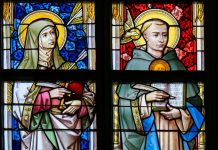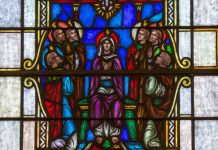
by Jeanne Heiberg
A blessing is when I’m aware that God favors me.
It’s something very good.
Good health…good finances…good friends.
Something they say when you sneeze.
A bounty.
It’s something that makes you happy.
It’s the sun, the rain, to see the beautiful earth…just everything!
These are some of the answers I received when I asked people in a dining room what the word blessing means. The setting was appropriate, since many people say a blessing over their food before eating. The words happy and bounty have rich connotations; happy is sometimes substituted for the word blessed in Jesus’ Beatitudes (see Matthew 5:3-12).
Autumn is a season for celebrating bounties and blessings, especially in three great feasts:
1. In the celebration of All Saints, when we remember the harvest of blessed souls shining in heaven, still helping and blessing us on our journey of life, still inspiring us by what they did while on earth.
2. In the celebration of All Souls, when we remember our own loved ones whom we help with our prayers and hope to see when our own harvest time comes.
3. In the celebration of Thanksgiving, when we remember harvest blessings of earth, and God’s many gifts of food, family, friends, and all good things we enjoy throughout the year.
There is also the feast of St. Francis, October 4, with its traditional Blessing of the Animals. Francis loved animals. He preached to the birds and tamed wolves. He fully lived Jesus’ Beatitudes, especially the first one: “Blessed are the poor in spirit,” and the seventh one, “Blessed are the peacemakers.” Saint Francis is credited with giving us a beautiful prayer that begins, “Make me a channel of your peace.”
The blessing of animals echoes the biblical creation story when God creates and blesses living creatures (Genesis 1:22), including people (1:27-28 and 5:2). God blesses even the seventh day (2:3) as a day of rest, a time to remember our blessings. This link to the Creation Story shows that blessings mean an abundance of life, hope, and potential. No wonder many people call birth a “blessed event” and newborn babies “blessings.”
Blessings in the Bible
Blessings are found throughout Scripture—the Hebrew Scriptures as well as the New Testament. For example, after the flood, Noah is blessed, as are the patriarchs Abraham (see Genesis 12:2-3) and Isaac (see 26:3-4). It was important to Isaac’s son Jacob that he—instead of his older brother Esau—receive his father’s blessing, even though the older brother is due the blessing. Jacob’s mother disguises him as Esau so that Jacob receives the powerful blessing that makes him the leader of the clan, the link in the line that forms the nation of Israel. This also makes him an ancestor of Jesus.
Isaac’s blessing of Jacob brings the power and presence of God into the picture so that Isaac cannot revoke it once it is given. A blessing is a gift of life from Yahweh which, in turn, brings further good. In ancient Hebrew, the gift of life from Yahweh was realized in understanding, wealth, large herds, vineyards, strong sons, beautiful daughters, security, and peace of mind.
Blessings abound throughout Scripture. Many Jewish prayers begin with the words “Blessed art though, O Lord, King of the Universe;” many psalms include these words as well.
Blessings continue in the New Testament—in the Gospels, the Acts of the Apostles, and the Letters of the Apostles.
Blessings in the Beatitudes
The most famous blessings are the Beatitudes (see Matthew 5:3-12), given to us by Jesus, promising happiness and rewards to those who observe certain virtues. These virtues turn purely earthly views of things upside down. While the world encourages people to seek wealth, honor, power, prestige, and the ability to exercise control over others, Jesus says that blessed are the poor in spirit, the meek, and the pure of heart seeking God single-mindedly. Jesus even promises blessings such as happiness to those who mourn and suffer persecution for his sake and the sake of his message.
The word blessed is often translated as “happy.” Jesus’ gift of the Beatitudes, given during his Sermon on the Mount, is all about attitudes and actions that make us happy and lift us to a higher level of mind, heart, and spirit.
Beatitude Paradox Now
In our time, we are encouraged to promote self-esteem in children—and so it seems a paradox to encourage them to be humble. However, healthy self-esteem and humility are not in opposition to each other. Children who feel insecure and unloved may tend to aggrandize themselves and put down others, to demand attention and recognition. On the other hand, inner security and peace flow from a humble heart that appreciates others and works with others in harmony.
What does this mean in an age when parents and teachers are told to help children develop self-confidence and healthy self-esteem? Is this at odds with teaching children to be humble?
Actually, arrogance often is built on lack of confidence and self-esteem. People who lack confidence and healthy self-esteem often try to bully others, put others down, and get more for themselves (out of fear) in an effort to compensate for what they feel lacking in themselves. Then, arrogance and false pride lead them away from being teachable, from being willing to learn.
If you are meek and humble, you are teachable. Self-confidence rests on what you know well, on the skills and abilities that are yours, and on the gifts you have to give to the world. Being teachable means that you know you can learn more, that others around you know and do things you cannot, that there is something you can learn from parents, teachers, friends—almost everyone you know and meet
On the other hand, overconfidence, arrogance, and a know-it-all attitude limits you and stops you from learning, from appreciating what others have to offer. The happiness and blessings of a humble and teachable heart are lost; you don’t learn and you don’t grow.
The Third Beatitude—“Blessed are the meek” (meek is sometimes translated as lowly)—comes with a promise that “they will inherit the land.” It’s logical! People who are not arrogant, who are open to others, and who are willing to learn all they can are better equipped to meet their goals and get their needs met and be more successful in life! It takes humility to consult others and ask for advice and help.
Those we ask for help can (and should) include God, who hears the cries of the poor and helps them. When we ask God for help with our goals, needs, and wants, we will be heard in some way.
Say to the Children
As we come to the autumn harvest feasts, it is good to remember all the blessings that God gives us. One of the gifts of Scripture is what it tells us about how God has blessed creation. One of Jesus’ great teachings is found in what we call the Beatitudes, which are eight ways of looking at life that turn the values of the world upside down.
The world says that to be happy you need to be rich and powerful and popular. Jesus, however, says that blessed are the poor in spirit, the meek, the humble, the pure of heart, those who single-mindedly seek God, and who work for peace. (Review the Beatitudes, if you wish, and some of the ideas presented earlier.)
How can you live the Beatitudes? How can you become a peacemaker? Here are some things you can do:
* Private prayer is important. Develop your own personal dialogue with God, angels, and saints.
* Develop a rich, harmonious, happy inner life of heart, mind, and spirit. Attending religion classes and going to Mass help you with that. Attend them in a teachable, loving frame of mind.
* Listen to others. See what you can learn from them. (This does not mean you have to go along with them, especially if they want to do foolish or harmful things.)
* Don’t fear conflicts. People have different views, needs, wants, and interests, and there are bound to be disagreements, even conflicts. Open discussions and peaceful exchanges of ideas are good ways to deal with differences. Try not to run away from conflicts; there’s no growth in that. Neither is there growth in arrogance, in forcing your viewpoint or your way of doing things on others. Have confidence in your views and skills, but respect those of others and work together for common ground.
* Forgive others and apologize when you make mistakes.
* Do what you can to help alleviate hunger, homelessness, sickness, and suffering in the world, since out of these there often arise conflicts and wars.
The refrigerator is your family’s communication center, so put on it magnets with messages and symbols of blessing and peace. This will help you and your family remember how many blessings you have. Making the blessings-and-Beatitudes magnets can be a prayer to live the Beatitudes and be happy. Here are eight symbols to get you started. You can find more on the internet.
1. a dove with an olive branch, also a symbol of the Holy Spirit, always ready to bless you and help you attain spiritual growth and become a blessing of peace to others
2. a rainbow, showing many colors in harmony; when many different kinds of people live and work in harmony, they work toward peace and bless one another
3. two interlocking hands, showing support and help for one another and standing for brotherhood/sisterhood, working together, and for forgiveness
4. a loaf of bread, whole or being broken; bread—food—is one of God’s greatest blessings, whether it is shared at home, with friends, or at the table of the Lord at Mass
5. a sun, the source of life, of the food we and our fellow creatures eat, and a symbol of our loving and creating God
6. a humble and gentle sheep, symbol of the poor in spirit, a teachable person, and also of the Great Teacher Jesus, the Lamb of God, a blessing for all who love and accept him
7. hand raised in blessing, with the index and middle fingers extended (symbolizing the humanity and divinity of Jesus) and the other three fingers (symbolizing the Trinity) folded down, the thumb over the two smaller fingers; all our blessings come from what is symbolized in this gesture
8. one great heart or a circle of hearts symbolizing love, one of the greatest blessings of all
Or you might want to consider making a star, a broken sword, a cross with leaves and/or flowers on it, flowers, or a butterfly.
ACTIVITY: Blessings-and-Beatitudes Craft
MATERIALS
* magnetic strips, buttons, or sheets
* construction or origami paper, foam sheets, card stock, or cardboard from cereal boxes to serve as the background (or the new duct tape that comes in sheets as well as rolls, in shiny holographic patterns)
* pencils, markers
* circle templates (for example, a round glass or small dish the size of the magnate you want—1” to 3” or even up to 5” if you use magnetic sheets)
* scissors
* glue
Optional: craft jewels and small, precut foam shapes such as letters, hands, hearts, doves, flowers, etc.
PROCEDURE
1. Trace around the circle template on the background you select. (If you use magnetic strips, use stiff cardboard for your background, such as empty cereal boxes; cover the cardboard with your choice of colored paper. If you use magnetic sheets, cut background directly from the sheet.)
2. Draw the peace/blessing symbol on a contrasting color of background material and cut it out.
3. Glue the peace/blessing symbol(s) and other craft jewels and precut shapes to the background. (If you use magnetic strips, reinforce the symbol with another piece of card board before gluing a magnetic strip to the back.)
Blessings-and-Beatitudes Prayer
Have students place their blessings-and-Beatitudes magnets on the prayer table and then form a circle around the prayer table. Also place a dish of holy water and a sprinkling sprig on the prayer table.
Opening Song: “Blest Are They.” Words by David Haas. © 1985 GIA Publications. Found in Gathered, Third Edition.
Opening Prayer: Thank you, Heavenly Father, for blessing all your creation and gifting us with so much beauty and goodness. Thank you for creating us in your image to bless and care for each other. Help us to appreciate all your gifts and to care for them. Help us to be blessings to one another, especially our families, our neighbors, our teachers, and our friends.
All: Amen.
Readings: Genesis 1:22, 28; 5:2 (Creation and God’s blessings); Genesis 12:2-3; 26:3-4 (the blessings of Abraham and Isaac); Matthew 5:3-12 (the Beatitudes)
Commentary: In a novel by Leo Tolstoy, a famous Russian writer, there is a scene of a mother blessing her child with the sign of the cross on the child’s forehead. This is a Russian custom. It shows us that we can bless others around us. When we live in God’s love, God’s blessings can flow through us to others, and through others to us. This is how God wants us to live.
Blessing of Magnets: Knowing that each of us can be a blessing to others, I now bless these blessings-and-Beatitudes magnets that we have made. Loving Lord God, may the peace and blessings that these symbols represent help us become blessings to each other. May they decorate our refrigerators, where so many blessings are stored, and remind us that you love us and want to nourish our bodies, minds, and spirits to love and serve you and one another. (Sprinkle holy water over the magnets or make the sign of the cross over them.)
Blessing of Students: As I make the sign of the cross on the forehead of each person, I invite everyone to pray for the person I am blessing. (Bless each person present by tracing the sign of the cross on his or her forehead with your thumb. For a large group, have several adults do this, or skip to Blessing of One Another.)
Blessing of One Another: Now bless the person to your right and then bless the person to your left by tracing the sign of the cross on their foreheads. This will help you remember that God wants you to be blessings to those around you, to each other. (If this part of the blessing occurs quietly, and the group is small, you may invite students to bless all other students present.)
Closing Song: “Beatitudes.” Text based on the Beatitudes; Mike Balhoff. Music, Darryl Ducote. Text and music © Damean Music. Found in Breaking Bread, Music issue, published by OCP. Or “Blest Be the Tie That Binds.” Text by John Fawcett. Music by Johann Nageli. Use your search engine to find this on YouTube.
Jeanne Heiberg, MFA, is the author of Advent Arts and Christmas Crafts (Paulist Press), plus 15 other books and many publications, including Advent calendars. She has taught art, writing, creative catechetics, and meditation to all ages, and has directed parish catechetical programs.
Copyright 2014, Bayard, Inc. All rights reserved. This article is protected by United States copyright and other intellectual property laws and may not be reproduced, rewritten, distributed, redisseminated, transmitted, displayed, published or broadcast, directly or indirectly, in any medium without the prior written permission of Bayard, Inc.
This article was written by the Catechist Staff and appeared in Catechist magazine, February 2014.
Image Credit: Shutter Stock 578942014




